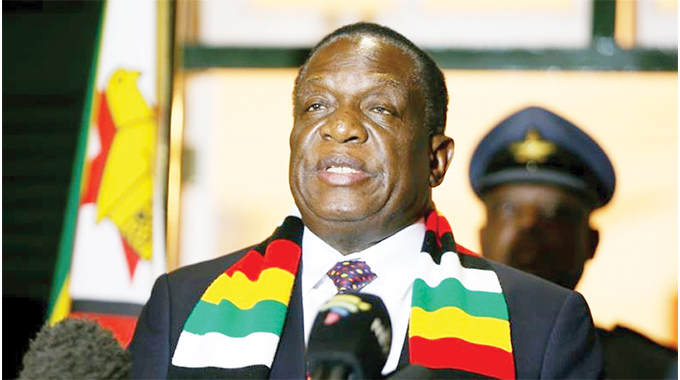COMMENT: Budget surplus sets right tone for NDS1 success

ONE of the key milestones achieved by the implementation of the Transitional Stabilisation Programme (TSP) between 2018 and 2020 was fiscal discipline and budget balance, informed by the restoration of macro-economic stability.
Governments generally experience a fiscal deficit when they exceed budgeted spending and end up using more money than the revenue generated from taxes and other sources excluding debt during the fiscal year.
In the case of Zimbabwe, which had experienced persistent budget deficits during the multi-currency regime, the Government had little room for capital spending on development projects as the public wage bill, alone, almost gobbled the entire budget. Supplementary budgets were the order of the day as a result.
Amid continued sanctions, the use of the United States dollar, despite bringing about price stability since the peak of hyperinflation in 2008, was also no longer sustainable in the absence of external lines of credit and subdued domestic production.
Producers had also complained over recurrent trade deficit, as imports flooded the local market targeting easy forex while local products were regarded as less competitive for exports. The situation had left the Government with no option but to only close the gap between income and spending by subsequently borrowing from the local and external funders, thereby increasing the national debt.
A serious leadership knows very well that in the long term this is detrimental for economic growth and stability. This explains why Zimbabwe under former President Robert Mugabe had accumulated debts running into billions of dollars and struggled to extricate itself from stagnation.
The scenario necessitated adoption of a robust transitional stabilisation drive to reverse the tide, which the Second Republic led by President Mnangagwa quickly embraced in 2018 under the “austerity for prosperity” focus. Indeed, the austerity reform measures were tough and painful to every Zimbabwean. What is encouraging now is that two years down the line, the right economic fundamentals are in place and the country has successfully turned the tide of austerity to consolidating economic recovery in an environment supported by fiscal balance.
For the first time in many years, Zimbabwe was able to achieve a budget balance in the month of September 2018 and maintained the stance in October of the same year when it recorded its first surplus of $29 million.
The country has kept the surplus momentum through 2019 and managed to strike fiscal balance in 2020 despite the adverse impact of Covid-19. Just last week the Treasury issued a report showing a budget surplus amounting to $9,8 billion for the first quarter of 2021. This is an indicator that continued fiscal consolidation measures are working positively for the economy as evidenced by the sustained macro-economic stability and growing domestic market confidence, Finance and Economic Development Minister, Prof Mthuli Ncube, said.
As we reported yesterday the Government reforms, coupled with adoption of digitisation, have also enhanced domestic revenue collection with the Zimbabwe Revenue Authority (Zimra)’s first quarter collections clocking $90,62 billion, which was 4,73 percent ahead of targeted $86,52 billion.
But many could be wondering what the budget balance and surplus means to the ordinary man on the street? For starters, as already explained above, a budget balance is healthy for the economy. A balanced budget is critical in consolidating the gains achieved on the monetary and fiscal front, whilst also building resilience and recovery of the economy against future external shocks.
The gains of fiscal equilibrium are further evidenced by the significant drop in annual inflation. Similarly, the exchange rate has stabilised at around US$1: ZWL$84 throughout the quarter. Since June last year, the exchange rate stability at the official foreign exchange auction platform has led to price discovery and predictability, which has been lauded by business leaders albeit minimal negligible fluctuations.
“On the fiscal front, a budget surplus of $9,8 billion was recorded as the Government continued fiscal consolidation for ensure stability and restore market confidence,” said Prof Ncube.
“Success of stabilisation reforms is also evidenced through a significant drop in the annual inflation rate to 240,6 percent by March 2021 from 837,5 percent in July 2020.”
We implore the Government to further fine tune the forex auction operations and harmonise private sector concerns so as to allow more players to trade on the formal market. This should go a long way in eradicating parallel market activity and enhancing confidence in the local currency.
As the largest employer, the Government should also consider further improvement in salaries for its workers in tandem with resources available, which will boost morale in the provision of public service and enhance aggregate demand.
In the broader scheme of things, the budget balance and surplus are a big boost to the new National Development Strategy (2021-2025), a successor to the TSP and a key building block towards an upper middle-income economy by 2030.
The situation that Zimbabwe is in now, offers an ideal opportunity for a restart to invigorate savings, boost production and incomes as well as stimulating public investment towards the revamping and development of a better infrastructure ecosystem for the country.
Essentially, the budget surplus means the Government is not only cushioned from debt but widens scope for capital spending on new major infrastructure projects such as roads, dams, hospitals, schools as well as social spending. The provision of widespread infrastructure services has a huge value chain impact, which creates more opportunity for employment and generation of incomes and consumer spending.
In the context of the disruptive impact of Covid-19, Zimbabwe would have paid a heavy price had it not had fiscal discipline as in the past years. In line with the devolution agenda and the quest for sustainability amid sanctions, the country must rely more on its domestic resources, as opposed to debt or donor financing. The budget surplus trajectory, thus, empowers Zimbabwe to fully exploit diverse opportunities that exist across all districts and provinces in order to build a better future for all.










Comments